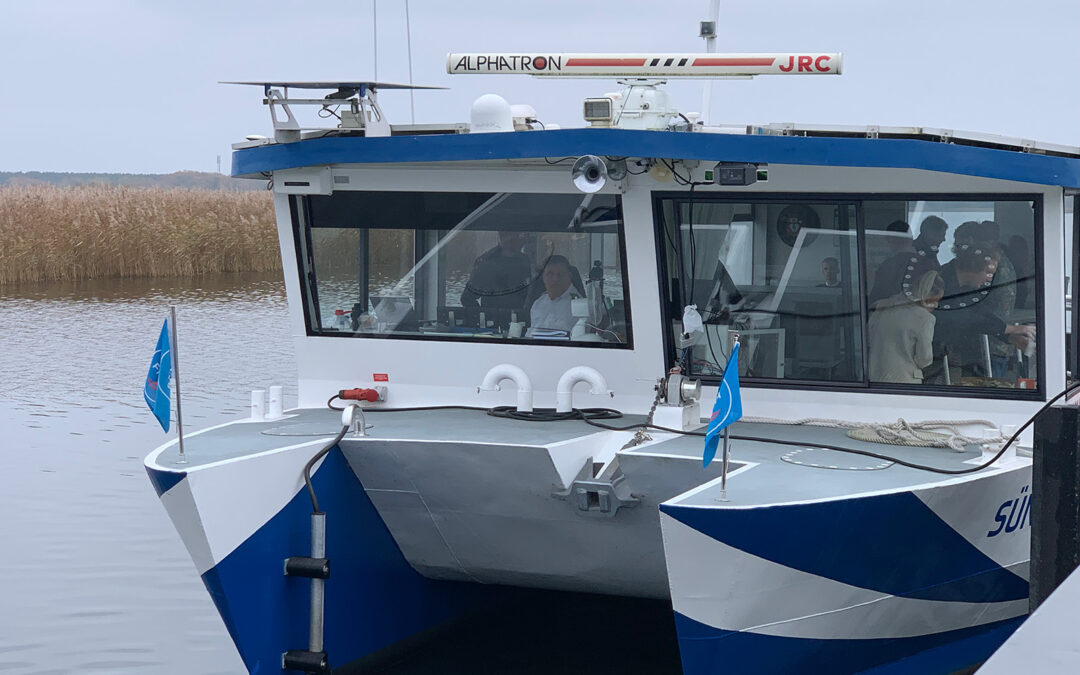Innovative applications of 5G campus networks and autonomous systems in the maritime industry were the focus of the final meeting of the 5G research project 5G-PortVG. The partners involved in the joint project presented the results of three years of research and development at the event.
The project focussed on the use of 5G for real-time communication and the control of autonomous vehic-les, drones and robots in port facilities. These technologies make it possible to automate and optimise transport processes, thereby reducing costs and increasing safety. Among the results presented were use cases demonstrating how, for example, autonomous cranes and vehicles can be controlled in real time using 5G, resulting in smoother and faster handling.
The final meeting of the 5G-PortVG project on 7 November 2024 took place in a special setting: on Lake Sellin in the real laboratory of the Vorpommern-Rügen tourism region. This maritime backdrop provided a fitting setting for the presentation of the results of the last three years. In the presence of guests, in-cluding the Digital Minister of the state of Mecklenburg-Vorpommern, Christian Pegel, the project part-ners demonstrated the possibilities of using 5G technology in campus networks for the maritime industry on board the solar ferry ‘Sünje’, which is equipped with 5G technology. During the crossing from Sellin pier to Baabe harbour, the event focused on how the 5G network installed on site supports the use of assistance-based driving technologies. The live demonstrations and presentations showed how the 5G network processes data from sensors such as LIDAR and radar systems in real time and uses it to control and monitor autonomous vehicles on the water. A particular highlight was the demonstration of the au-tonomous movement of the ferry with the help of the sensor technology installed on board, which ensu-res that the ferry travels autonomously across the lake without the intervention of the captain in a pre-viously defined corridor. The ship’s control lever moved on its own as if by magic and the systems control-led all the necessary steering manoeuvres autonomously.
After returning to land, the mobile 5G campus network set up on site was the centre of attention. During the presentations, the essential parameters of data traffic and the resulting requirements for such a campus network were discussed. Potential application scenarios for transportable campus networks were also outlined. The passenger information system, which forms the basis for a variety of value-added services for passengers, was then presented on land. Furthermore, the system enables the provision of real-time data on journey times and the position of the ship as well as a ‘virtual ride’ on the bridge of the Sünje. A live video stream can also be made available via the 5G network. The return journey concluded with a look at the autonomous logistics system developed in the Port5G project, which can also use a 5G campus network to control a fleet of shuttle transporters for warehouse management and goods logistics in port facilities.
About the project: As part of the 5G-PortVG joint project, new 5G-based services and products are being tested in three lead projects that will serve as user-centred maritime assistance systems in the future. Together, the projects form the basis for enabling new applications in the port sector. They also de-monstrate and evaluate the added value of 5G technology, particularly in comparison to existing techni-cal systems. With the use of 5G infrastructure in port facilities, the entire logistics, transport and organi-sational processes can be made more efficient, effective and secure. The project, which is supported with funding from the 5x5G innovation competition organised by the Federal Ministry for Digital and Transport Affairs (BMDV), is being driven forward by a total of six project partners. Under the leadership of the telecommunications planning company DEN GmbH, aconium GmbH is working together with Stralsund University of Applied Sciences, the shipping company ‘Weiße Flotte’, the technology centre Witeno GmbH and the ship supplier Nautitronix to implement the project.
Further information on the ‘5G-PortVG: 5G campus networks in commercial harbours’ funding project can be found here.

